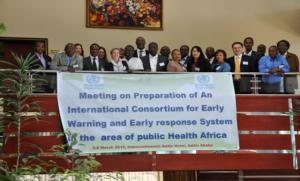Predicting, Preventing and Managing Public Health Effects of Climate Variability and Change in Africa
Addis Ababa, 05 March 2013 -- The meeting on preparation for an International Consortium for Early Warning and Early Response Systems in the area of Public Health in Africa, that is organized by WHO, kicked off at Intercontinental Addis Hotel, in Addis Ababa, Ethiopia. The meeting which aims to strengthen the resilience of African countries to climate change in the area of public health brings together participants from more than 20 countries in the world and institutions. These include Kenya Medical Research Institute (Kenya), Medical Research Council (South Africa), Noguchi Memorial Institute for Medical Research (Ghana), Biotechnology Center University of Yaoundé I (Cameroon), Malaria Research and Training Centre (Mali), National Institute for Medical Research (Tanzania), African Center for Meteorological Application for Development (Niger), International Research Institute for Climate and Society (Columbia University, USA), Mailman school of Public Health (USA), INDEPTH, NASA and NOAA.
In his opening remark, Dr. Pierre M’Pele-Kilebou, WHO Representative in Ethiopia, stated that Ethiopia is one of the countries that made exemplary progress to address health and environment issues. Ethiopia has fast tracked implementation of the Libreville Declaration on health and environment in Africa, and on issues of climate change has achieved remarkable results in understanding its climate as any other African countries has been able to do so far. He explained that WHO, in collaboration with UNEP and other partners, coordinated the preparation and endorsement of a Joint Statement of Ministers of Health and
Ministers of Environment on Climate Change and Health in Luanda, Angola in 2010. In 2011, the WHO Regional Committee for Africa endorsed the Resolution AFR/RC61/R2 on a Framework for Public Health Adaptation to Climate Change in the African Region. On that basis, the WHO Regional Office for Africa now has produced a Health sector’s Plan of Action for public health adaptation to climate change developed which was agreed upon by 38 member states.
The 61st Session of the WHO Regional Committee for Africa adopted Resolution AFR/RC61/R2 on a Framework for Public Health Adaptation to Climate Change for Africa. The Resolution requests the WHO Regional Director to establish a Pan - African Programme for Public Health Adaptation to Climate Change.
Decision SS4/1 of the African Ministerial Conference on Environment supports the above resolution and requests the African Union Commission, the United Nations Environment Programme, the World health organization and other development partners to support the implementation of the Framework for Public Health Adaptation to Climate Change for Africa.
Preliminary discussions were held with a number of institutions including the United Nations Environment Programme, the World Meteorological Organization, the African Development Bank, the International Research Institute for Climate and Society, the Earth Institute at the Columbia University, the United States Agency for International Development, the National Institute for Environmental Health Sciences and the World Bank. A consensus emerged from these discussions on international assistance priorities to help African countries to strengthen their resilience to climate change. The above organization agreed to
participate in an international collaborative effort to support development and operationalization of early warning and early response systems in order for African countries to be able to predict, prevent and manage acute public health effects of climate change.
At the end of its deliberations over the four days until 08 March 2013, it is expected that the meeting will identify concrete actions resource requirements, and make recommendations on how to immediately initiate its operations, with the objective of reducing death and casualties caused by extreme weather events.
______________________________________________________
For more information, please contact:
Waltaji Terfa, National Program Officer - Public Health and Environment;
E-mail: waltajit [at] et.afro.who.int
WHO Country Office - Ethiopia
Email: who-wro [at] et.afro.who.int;">who-wro [at] et.afro.who.int
Country Website: More
P.O. Box: 3069; Fax: +251115514037; Phone: +2511155347
